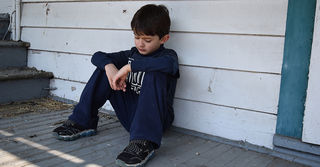Adverse Childhood Experiences
How Adverse Childhood Experiences Affect You as an Adult
What are adverse childhood experiences and how do they impact us later in life?
Posted December 10, 2019 Reviewed by Abigail Fagan

In California, where I live and work as a sex and intimacy disorders specialist, there is a movement for mandatory adverse childhood experiences (ACES) assessment in all public and private medical and psychotherapeutic settings. So, regardless of an adult patient’s presenting issue(s)—medical, psychological, or both—clinicians would screen for childhood trauma. The reason for this push, which I strongly support, is that research clearly links early-life trauma, neglect, and other adverse experiences with adult-life medical, psychological, and intimacy issues.
What Is the ACES Screening?
The ACES test that we use in California screens for 10 forms of childhood trauma—five personal, five familial.
Personal traumas:
- Physical abuse
- Verbal abuse
- Sexual abuse
- Physical neglect
- Emotional neglect
Familial traumas:
- Addiction
- Domestic violence
- Incarcerated family member
- Mental illness
- Divorce or abandonment
The ACES test is scored 1 through 10, with each type of trauma experienced counting as one point. So an individual with an alcoholic father and an early-life history of verbal abuse and emotional neglect would score three on the ACES screening.
Why Does This Matter?
Research consistently links ACES to adult-life physical, emotional, and relational issues. The higher a person’s ACES score is, the more likely that person is to experience physical ailments like heart disease, diabetes, and cancer. Similarly, the higher a person’s ACES score is, the more likely he or she is to experience psychological and behavioral issues like anxiety, depression, and addiction.
Research is very consistent with these results. For example, one wide-ranging study found that individuals with an ACES score of four or higher are:
- 1.8 times as likely to smoke cigarettes
- 1.9 times as likely to become obese
- 2.4 times as likely to experience ongoing anxiety
- 2.5 times as likely to experience panic reactions
- 3.6 times as likely to be depressed
- 3.6 times as likely to qualify as promiscuous
- 6.6 times as likely to engage in early-life sexual intercourse
- 7.2 times as likely to become alcoholic
- 11.1 times as likely to become intravenous drug users
The amount of research producing similar results is almost overwhelming. So there's an undeniable link between early-life trauma and numerous adult-life physical and psychological disorders.
At Seeking Integrity Treatment Centers, we test every client for early-life trauma, and even the individuals who initially insist that they had an idyllic childhood tend to score 3 or higher. We treat sex and intimacy disorders, which tend to be shame and trauma driven, so this is hardly a surprise. What you may find surprising is that almost two-thirds of all people score at least one point on the ACES screening.
In a nutshell, research reveals that childhood trauma is very common among all races and social strata. Very often it is unidentified, unacknowledged, and unaddressed. And it contributes to all sorts of adult-life physical, emotional, and relational problems.
ACES Screenings Are Useful but Not Perfect
The basic ACES Screening test is a mere ten questions, and it’s limited to five personal and five familial categories. The instrument does not examine bullying, racism, financial struggles, severe illness or accident, and a thousand other possible forms of trauma. Additionally, there is a lack of explanation about what may qualify in a particular category. For instance, an overly enmeshed, covertly sexualized relationship with a parent is, from a psychological standpoint, a form of both sexual abuse and emotional abuse/neglect (adversely affecting the child’s emotional and relational development). But most people, especially those new to the process of healing, will not readily identify it as such.
Usually, however, forms of trauma not covered by the ACES screening and not-so-easily spotted forms of trauma that are covered will trigger at least one or two peripheral yes responses. At the very least, a client will say, “Hmmm, I’m not sure about this one.” Any yes response or any uncertain response should automatically cause the clinician to explore the matter further, recognizing that a full course of treatment, whatever the presenting issue happens to be, may eventually require the exploration, acceptance, and resolution of underlying ACES.
Trauma Treatment
When early-life trauma is uncovered via assessment or during the course of another treatment, and when that trauma appears to be linked to the patient’s adult-life issues (physical, emotional, relational), it will need to be acknowledged and addressed, preferably with the assistance of a clinician who specializes in trauma work as part of his or her practice.
At times, it is wise to address the patient’s presenting issue before delving too deeply into his or her underlying trauma. When dealing with an addiction, for example, it is best to break through the addict’s denial, to define what sobriety looks like, and to develop coping skills the addict can turn to when triggered (by stress, anxiety, loneliness, boredom, depression, and other forms of emotional discomfort) toward the addiction. Otherwise, the emotionally painful work of trauma therapy could easily trigger an addiction relapse. That said, once sobriety is established and the addict has a solid support network in place, the deeply emotional work of understanding and resolving trauma should absolutely take place. If not, the individual will continue to struggle with the feelings that drove the addiction in the first place. And a similar statement could be made about any adult-life issue—physical, psychological, relational—that is impacted by unresolved childhood trauma.
The ACES screening assessment can be found at this link.
Facebook image: Sabphoto/Shutterstock




